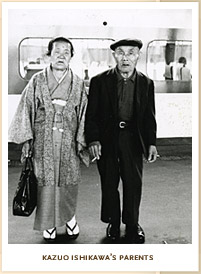The Buraku Issue
Buraku people are a Japanese social minority group, ethnically and linguistically indistinguishable from other Japanese people. They face discrimination in Japan because of an association with work once considered impure, such as butchering animals or tanning leather. In particular, they often have trouble finding marriage partners or employment.
Brief Historical Context
During the Tokugawa feudal period (1603-1867), what is now called ‘Buraku discrimination’ was officially structured in a caste system that dominated society at that time. This system formalized a division of labor that associated people with their jobs, and society was stratified into four primary castes: warriors, farmers, artisans, and merchants, with a portion of the population falling outside of this basic caste structure. These outcasts held jobs that the rest of the population refused (frequently on the grounds of ritual and religious impurity) such as working in slaughterhouses, tanning leather, and performing executions. Furthermore, their social habits – their clothing, where they could walk, to whom they could speak, where they could live – were all regulated by various laws in a way that set outcastes apart from the rest of the population. Some historians trace a preceding informal version of this system, which provided a basis for treating different kinds of people differently in social settings, back to the Heian period (794-1185).
Modern Forms of Discrimination
The Tokugawa feudal system set the grounds for how Buraku discrimination functions in modern-day Japan, but does not fully explain the current manifestations of discrimination. Those facing discrimination are not limited to descendants of Tokugawa outcastes. The original meaning of the word Buraku is ‘neighborhood’ or ‘community,’ but it has become shorthand for tokushu buraku, or ‘special communities,’ a euphemistic designation for the neighborhoods in which descendants of outcasts have historically lived. While these neighborhoods were relatively stable during the Tokugawa period, after the Meiji Restoration (1868), populations became more mobile, with events such as earthquakes, wars, and economic growth leading, over the next century, to the massive relocation of people throughout Japan. As a result, people who were not descendants of outcasts moved into neighborhoods formerly designated as outcast, and boundaries of these neighborhoods shifted. Despite these changes, these Buraku neighborhoods are still known, tracked formally in governmental registers and informally in daily conversations that people have about their own neighborhoods and hometowns.
Present-day Buraku discrimination is primarily based on whether a person lives in a Buraku neighborhood, or whether her or his parents are from such a neighborhood. This means that it is possible for people with no connection to the Tokugawa outcaste status to be labeled as Buraku and face anti-Buraku discrimination. It is even possible for a family to unknowingly move into an historically Buraku neighborhood and, unbeknownst to them, become Buraku. The stigmatized category of Buraku, which is based first and foremost on an individual’s family lineage and occupation, has come also to depend on one’s family address.
The largest Buraku political organization, the Buraku Liberation League (BLL), estimates that there are over 6 million Buraku people nation-wide. The BLL produces annual reports that track the hundreds of cases of discrimination that happen throughout Japan every year, cases which include harassment and refusal of marriage or employment. The political movement’s efforts have resulted in great improvements in the quality of life in Buraku neighborhoods, the elimination of physical violence against Buraku people, and a continuing reduction in other forms of discrimination as well. However, anti-Buraku prejudice is still prevalent throughout the country, and discrimination remains a key issue.
The United Nations recognizes Buraku discrimination as an ongoing problem. In 2003, due to the work of the BLL and partner organizations in other parts of Asia, the UN reaffirmed that discrimination based on work and descent is a form of discrimination prohibited by international human rights law. There are currently two independent special rapporteurs researching the causes of and ways to address this form of discrimination around the world. Similarly, the UN Special Rapporteur on racism, racial discrimination, xenophobia and related forms of intolerance, Doudou Diene, has included recommendations for the elimination of Buraku discrimination in his recent report to the Japanese government.
